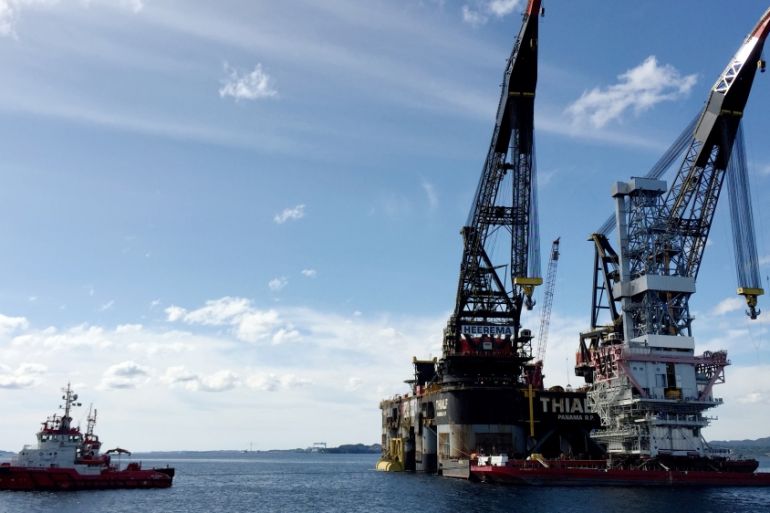Why we are suing the Norwegian government
The Norwegian government is violating the Paris Agreement and we are taking them to court.

For the first time ever, a government is being brought to justice for opening new areas for oil and gas extraction after signing and ratifying the Paris Agreement.
This historic court case is set to begin in Oslo, Norway, on November 14. Greenpeace and Norwegian environmental organisation Nature and Youth are challenging the Norwegian government in court for allowing oil companies to drill for new oil in the Arctic. For the first time in more than 20 years, the government has awarded oil licenses in a completely new area of the Barents Sea to 13 oil companies, a move that violates the country’s own constitution and contravenes the Paris Agreement.
Keep reading
list of 4 itemsLost Futures
Photos: Greek valley that became a lake stirs drought debate
Botswana threatens to send 20,000 elephants to Germany
At the time that the lawsuit was filed, then UN chief Ban Ki-moon said:“The fate of the Arctic is tied to the fate of Miami, Mumbai, Shanghai and [other] coastal cities … When the Arctic suffers, the world feels the pain.” This is a beautifully worded description of the alarming reality we are facing: the negative effect of climate change on the Arctic has catastrophic consequences around the world.
And yet, the Norwegian government sees fit to further exploit this pristine and vulnerable area, knowing that the emissions resulting from this new and unburnable oil (oil that we cannot afford to produce if we are to meet the Paris accord goals) will have a detrimental effect on the Arctic, and worsen the global effects of climate change.
At the same time as the trial starts in Norway, Fiji is hosting the United Nations climate change conference, COP 23 in Bonn, Germany, aiming to continue the work on the historic climate agreement struck in Paris two years ago. It’s the first time a Pacific island nation has held the presidency, presenting a unique opportunity for the voices of vulnerable states and people to be at the centre of decisions that will shape climate action.
This will be the first time the right to a healthy and safe environment is used in court.
The Pacific islands are among a small group of nations particularly vulnerable to climate change. In some cases, the threat is existential. Pacific leaders are calling for an end to fossil fuel extraction, a call that has so far been ignored by governments continuing oil exploration efforts. This call – specifically against fossil fuel extraction in new areas in the Arctic – will be heard by a judge in the Norwegian courtroom starting on Tuesday.
The judge will hear how the Norwegian government has failed the commitments it made as a developed nation in signing and ratifying the Paris Agreement. If the goals of the agreement are to be met, fossil fuel production has to start decreasing, not increasing. The world’s carbon budget will be broken if we add more.
Although the Norwegian government may hide under a reading of the document that covers only domestic emissions, the Paris Agreement means so much more than that. Developed nations such as Norway have committed to take the lead and have their efforts reflect the highest possible ambitions. The world also agreed to aim to reach the global peak of greenhouse gas emissions “as soon as possible”, keeping the global average temperatures “well below” 2C above pre-industrial levels, and to “pursue efforts” to limit global warming to 1.5C.
Allowing oil companies to search for and develop oil in the Arctic will push the peak further out in the future, add more unburnable carbon to the reserves and exacerbate climate change. Therefore, by opening up these new areas of the Arctic for drilling, the Norwegian government is breaking a commitment under international law.
It’s important to keep in mind that this lawsuit is about future oil that hasn’t been discovered yet. Oil that would not hit the market before a decade or two. And that’s the core of the problem. We have already discovered far more fossil fuels than we can afford to burn, if the goals in the Paris Agreement are to be fulfilled. Burning the reserves in currently operating oil and gas fields alone would take the world beyond 1.5C.
Greenpeace isn’t promoting the “sudden death” of fossil fuels, but encouraging a managed decline of existing reserves and a complete ban on new oil and gas exploration as absolutely necessary.
At the heart of the court case is also article 112 of the Norwegian constitution. This article explicitly grants people the right to a safe and healthy environment and also safeguards those rights for future generations. It places a duty on the Norwegian government to uphold these rights.
A constitution sits high above all other laws; government action should be safeguarding those rights. Article 112 limits what the government can do: It cannot make decisions that violate the right to a healthy environment for current and future generations.
We believe the Norwegian government has failed in its duty to safeguard this right by opening up new areas of the Arctic to oil drilling, which will worsen the already catastrophic effects of climate change.
This will be the first time the right to a healthy and safe environment is used in court. Around the world, some 90 countries have constitutions with similar stipulations, and this lawsuit can help guide other courts in interpreting these rights in their legal systems, and inspire more people to hold their governments to account.
Winning this case would not only leave millions of barrels of oil in the ground, but could also set a precedent for future climate cases around the world.
The views expressed in this article are the author’s own and do not necessarily reflect Al Jazeera’s editorial policy.
